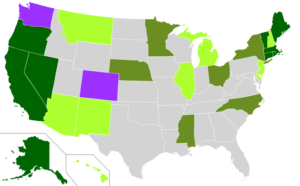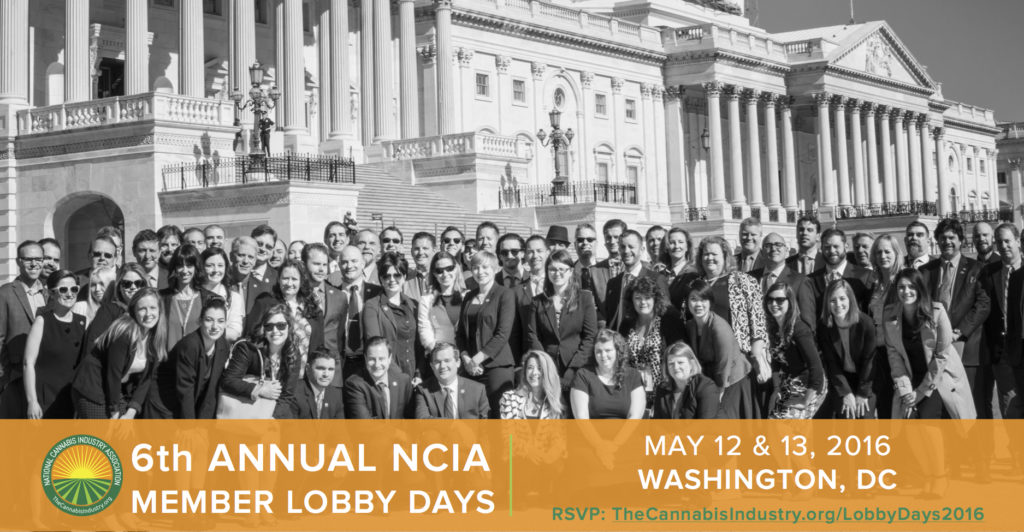2018 NATIONAL CANNABIS INDUSTRY FORECAST

by Michelle Rutter, NCIA Government Relations Manager
With the beginning of 2018, we start another election year. Multiple states in the midwest are running medical cannabis ballot initiatives, while Vermont is set to become the first state to legalize adult-use cannabis through the state legislature. In Washington, D.C., policy moves at a slower pace, but with Attorney General Jeff Sessions in office, it’s important to remain vigilant. Let’s take a look at what may happen in cannabis policy across the country:
MEDICAL CANNABIS POLICY
UTAH
- The Utah Patients Coalition (UPC) is leading a 2018 ballot campaign to establish a medical cannabis program. The initiative seeks to protect terminally and seriously ill patients with specific debilitating medical conditions, including HIV/AIDS, PTSD, and chronic pain, among others. In addition, the initiative allows for caretakers to administer medical cannabis and would issue four types of licenses if passed: cultivation facilities, processing facilities, independent testing laboratories, and dispensaries.
- The Chairman of the Senate Finance Committee, Orrin Hatch (R-UT) has introduced a medical cannabis research bill, and has even said on the Senate floor that medical cannabis can be an alternative to opioids. Passing the 2018 ballot initiative in his home state of Utah will be critical to furthering advocates’ work at the federal level.
- A recent poll done by the Salt Lake Tribune found that 3 in 4 Utahns support legalizing medical cannabis. The campaign must collect 113,143 signatures from registered voters in order to qualify for the ballot. As of October 2017, the coalition had already garnered 20,000 signatures.
MISSOURI
- A group called New Approach Missouri has formed and is in the process of collecting signatures for a proposed constitutional amendment to their state constitution that would legalize medical cannabis. The initiative would create a statewide system for production and sale of medical cannabis and provides for limited and regulated patient cultivation. Interestingly, the initiative levies a four percent retail tax, but all revenue in excess of the cost of regulating the medical cannabis program will go towards Missouri’s veterans.
- New Approach Missouri must to collect 160,199 valid signatures from registered voters in order to be placed on the ballot. As of December 2017, the campaign had collected roughly 100,000 signatures. A poll done in 2015 showed that 85% of Missourians support implementing a medical cannabis program.
OKLAHOMA
- Oklahomans for Health is the proponent of the upcoming state question SQ788, which would create a medical cannabis program. Obtaining a state-issued medical marijuana card would require a board-certified physician’s signature, though there are no specific qualifying conditions. The measure would enact a seven percent tax on marijuana sales, with revenue financing regulatory costs. Any surplus would be distributed: 75% to the General Fund to be used for education, and 25% to the Oklahoma State Department of Health to be used for drug and alcohol rehabilitation.
- The initiative has already qualified, and will appear on the ballot in November 2018. Polling data is scarce, however, a 2013 poll showed that 71% of Oklahomans supported legalizing medical cannabis.
SOUTH DAKOTA
- A group known as New Approach South Dakota is behind an effort to legalize medical cannabis in 2018. The group was also hoping to submit signatures to legalize adult-use cannabis, but was unsuccessful. The measure would set an excise tax on marijuana that would include a $50 per ounce tax on cannabis flower for buyers, and would have other taxes apply to buying immature plants and other parts of the cannabis plant.
- In November 2017, New Approach South Dakota submitted roughly 15,000 signatures to qualify for the ballot- that’s just 1,000 more than required. The state hopes to review submitted ballot initiatives in the coming months.
ADULT-USE CANNABIS POLICY
MICHIGAN
- The Coalition to Regulate Marijuana Like Alcohol has officially submitted ballot language to the State of Michigan that would legalize consumption and possession of marijuana for adults 21 and over in Michigan. The proposal enacts an excise tax on marijuana at the retail level in addition to the standard state sales tax and provides for state regulators to grant business licenses for cultivators, processors, testing facilities, secure transporters, retail stores and microbusinesses.
- In November 2017, the Coalition to Regulate Marijuana Like Alcohol turned in more than 360,000 signatures to qualify for the ballot– that’s 100,000 signatures beyond the 252,000 required by the state. Polling done in early 2017 showed that 57% of Michiganders would support legalizing cannabis.
VERMONT
- Vermont is poised to make history and become the first state to legalize adult-use cannabis through the state legislature in early 2018. In December 2017, Vermont House Speaker Mitzi Johnson (D) said, “It will be up for a vote in early January. I expect that it likely will pass in early January.”
- The state came incredibly close to passing language that would have legalized adult-use cannabis back in 2017, however, the legislature was unable to make changes Governor Phil Scott (R) requested before the session ended. The Governor has since stated that he is “comfortable” with signing legalization legislation.
OHIO
- The group that unsuccessfully ran a ballot initiative in 2015 to legalize cannabis in Ohio is making a comeback in 2018. In December 2017, a team announced that they will work to place a cannabis legalization measure on the ballot in 2018. Known as the Regulate Marijuana Like Alcohol Amendment, the measure would allow people over the age of 21 to purchase and use cannabis legally. The amendment would also create a taxed and regulated cultivation, processing, and sales system.
- Valid signatures from 305,592 registered voters are required before July 4, 2018, in order to qualify the measure for the ballot.
NEW JERSEY
- Unlike New Jersey’s Governor Chris Christie (R) , Governor-Elect Phil Murphy (D) is setting a positive tone on cannabis in the state. Murphy has advocated for legalization multiple times, and even made one of his campaign promises to legalize adult-use cannabis in his first 100 days in office.
- Democrats in the state legislature have already introduced multiple bills to tax and regulate adult-use cannabis, predicted to be worth more than $1 billion in the state. The full legalization bill currently being considered is S3195, sponsored by state Senator Nicholas Scutari (D). Sen. Stephen Sweeney (D), the state senate’s president, has already promised to pass the bill within the first three months of Murphy’s administration.
- Recent polling shows that over 60% of New Jersey residents support legalizing cannabis.
CANNABIS DECRIMINALIZATION
VIRGINIA
- In November 2017, voters in Virginia elected Ralph Northam (D) as their next Governor. Northam made cannabis decriminalization a centerpiece of his gubernatorial campaign, and has even spoken about the hemp cultivation and the medical benefits of cannabis.
- Virginia lawmakers considered but did not act on decriminalization legislation during the 2017 session. However, with the State Crime Commission conducting a study on the effects of decriminalization in the state at the request of the Republican Senate majority leader, advocates remain hopeful in 2018.
FEDERAL CANNABIS POLICY
- While 2018 is shaping up to be a busy year for cannabis policy at the state level, things will likely move slowly in Washington, D.C. NCIA will be working to ensure language protecting medical cannabis patients (the Rohrabacher-Blumenauer amendment, formerly known as the Rohrabacher-Farr amendment) remains in federal law. NCIA will also be lobbying to expand that language to apply to adult use states (McClintock-Polis amendment) and to include a banking amendment that would allow cannabis businesses access to financial services (Heck amendment).
- As leadership in both houses of Congress continue to negotiate the final version of the tax reform bill, there will be opportunities next year for Congress to make additions and changes on future individual tax legislation. NCIA will be looking at any possible avenues to have 280E legislation be included in future bills if the opportunity arises. Action on the cannabis banking bill is unlikely in 2018, however, NCIA will continue to advocate for a committee hearing, gather more cosponsors on HR 2215: The SAFE (Secure and Fair Enforcement) Banking Act, and work to identify a Republican lead sponsor for the bill in 2019.
- NCIA will also be working to ensure that the Cole Memo remains in place. Attorney General Jeff Sessions has recently said that the Department of Justice will be reviewing current memos, and that “Guidance documents can be used to explain existing law… but they should not be used to change the law or to impose new standards to determine compliance with the law… This Department of Justice will not use guidance documents to circumvent the rule-making process, and we will proactively work to rescind existing guidance documents that go too far.” While Attorney General Sessions is very clearly personally opposed to cannabis, it’s important to note that personal feelings are not official Justice Department policy.
- In addition, NCIA is working behind the scenes to educate the Trump Administration on cannabis policy, maintain the Cole Memo, protect cannabis patients and consumers, and make positive remarks regarding medical cannabis in 2018.


